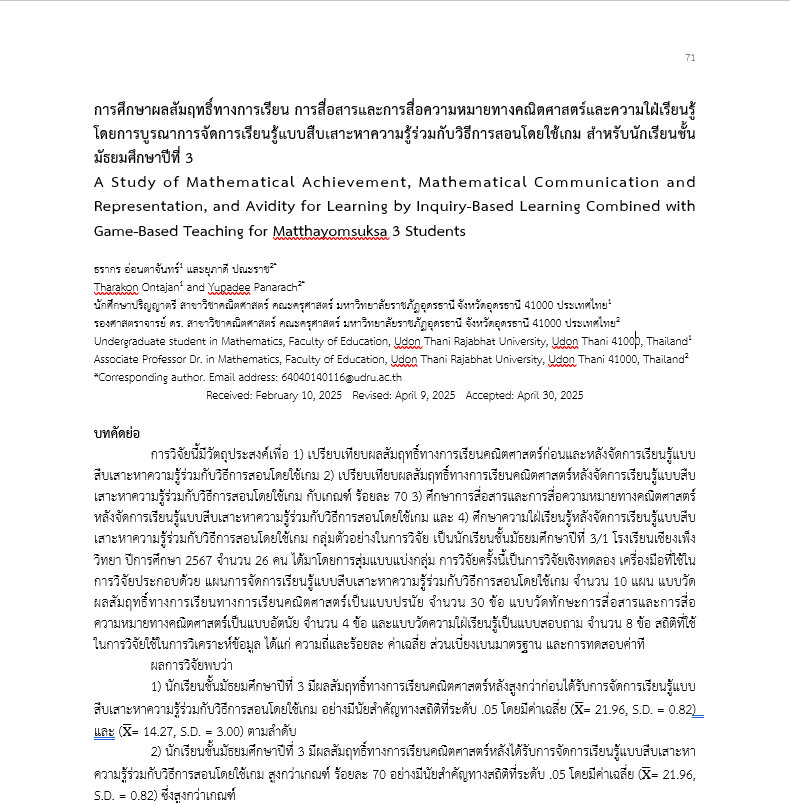A Study of Mathematical Achievement, Mathematical Communication and Representation, and Avidity for Learning by Inquiry-Based Learning Combined with Game-Based Teaching for Matthayomsuksa 3 Students
Main Article Content
Abstract
The purposes of this study were to 1) compare mathematical achievement before and after learning by Inquiry-based learning combined with Game-based teaching, 2) compare the mathematical achievement after learning by Inquiry-based learning combined with Game-based teaching with the 70% criterion, 3) study mathematical communication and representation, and 4) study avidity for learning after learning by Inquiry-based learning combined with Game-based teaching. The sample group comprised 26 students from Matthyomsuksa 3 at Chiang Pheng Witthaya School in the academic year 2024, selected by cluster random sampling. This study was experimental research. The research instruments included lesson plans by Inquiry-based learning combined with Game-based teaching, the mathematical achievement test, mathematical communication and representation test, and the questionnaire about avidity for learning. The statistics used in data analysis included frequency, percentage, mean, standard deviation, t-test dependent, and t-test one sample.
The results found as follows:
1) Matthayomsusa 3 students had higher mathematical achievement after learning by Inquiry-based learning combined with Game-based teaching at the .05 level of the statistical significance, with the mean score of (= 21.96, S.D. = 0.82) and (
= 14.27, S.D. = 3.00), respectively.
- Matthayomsuksa 3 students had mathematical achievement after learning by Inquiry-based learning combined with Game-based teaching that was higher than the 70% criterion at the .05 level of the statistical significance, with a mean score of (
= 21.96, S.D. = 0.82) which was higher than the criterion.
3) Mattayomsuksa 3 students had mathematical communication and representation after learning by Inquiry-based learning combined with Game-based teaching at the good level for 12 people at 46.15%, followed by very good level for 8 people at 30.77% percent, and fair level for 6 people at 23.08%, respectively.
4) Matthayomsuksa 3 students had the overall avidity for learning after learning by Inquiry-based learning combined with Game-based teaching at the highest level. They had highest average in participation (= 4.59, S.D. = 0.49), followed by knowledge recording (
= 4.69, S.D. = 0.47), and curiosity (
= 4.62, S.D. = 0.50), respectively.
Article Details

This work is licensed under a Creative Commons Attribution-NonCommercial-NoDerivatives 4.0 International License.
บทความที่ได้รับการตีพิมพ์เป็นลิขสิทธิ์ของวารสารครุศาสตร์ คณะครุศาสตร์ มหาวิทยาลัยนครพนม ข้อความที่ปรากฏในบทความแต่ละเรื่องในวารสารครุศาสตร์เล่มนี้เป็นความคิดเห็นส่วนตัวของผู้เขียนแต่ละท่านไม่เกี่ยวข้องกับมหาวิทยาลัยนครพนม และคณาจารย์ท่านอื่น ๆ ในมหาวิทยาลัยฯ แต่อย่างใด ความรับผิดชอบองค์ประกอบทั้งหมดของบทความแต่ละเรื่องเป็นของผู้เขียนแต่ละท่าน หากมีความผิดพลาดใด ๆ ผู้เขียนแต่ละท่านจะรับผิดชอบบทความของตนเองแต่ผู้เดียว
References
กระทรวงศึกษาธิการ. (2554). แนวทางการพัฒนา การวัดและประเมินคุณลักษณะอันพึงประสงค์ตามหลักสูตรแกนกลางการศึกษาขั้นพื้นฐาน พุทธศักราช ๒๕๕๑. (พิมพ์ครั้งที่ 3). กรุงเทพฯ: โรงพิมพ์ชุมนุมสหกรณ์การเกษตรแห่งประเทศไทยจำกัด.
จีรนันท์ แก้วปินตา. (2562). การส่งเสริมทักษะการสื่อสารทางคณิตศาสตร์และผลสัมฤทธิ์ทางการเรียนคณิตศาสตร์ของนักเรียนชั้นมัธยมศึกษาปีที่ 2 โดยใช้การสืบเสาะหาความรู้เป็นกลุ่ม. [วิทยานิพนธ์ปริญญาศึกษาศาสตมหาบัณฑิต สาขาวิชาคณิตศาสตรศึกษา]. มหาวิทยาลัยเชียงใหม่.
ณัชกวิตา แดงสว่าง. (2565). การพัฒนาผลสัมฤทธิ์ทางการเรียนและการใฝ่เรียนรู้โดยการจัดการเรียนรู้แบบสืบเสาะ (7Es) ร่วมกับเกมมิฟิเคชั่น เรื่อง โลกและการเปลี่ยนแปลง และทรัพยากรพลังงานในรายวิชาวิทยาศาสตร์ของผู้เรียนชั้นมัธยมศึกษาปีที่ 2. [วิทยานิพนธ์ปริญญามหาบัณฑิต สาขาหลักสูตรและการสอน]. มหาวิทยาลัยธุรกิจบัณฑิตย์.
นิตยา แก้วกันยา. (2555). การพัฒนาผลสมฤทธิ์ทางการเรียนและคุณลักษณะอันพึงประสงค์ของผู้เรียนชั้นประถมศึกษาปีที่ 6 รายวิชาคอมพิวเตอร์พื้นฐานโดยใช้รูปแบบการเรียนรู้แบบสืบเสาะหาความรู้ (5Es). [วิทยานิพนธ์ปริญญา ศึกษาศาสตร์มหาบัณฑิต สาขาวิชาหลักสูตรและการสอน]. มหาวิทยาลัยขอนแก่น.
ปรมินทร์ ธัญญะภู. (2566). การพัฒนาการจัดการเรียนรู้โดยใช้เกมทางคณิตศาสตร์ เพื่อส่งเสริมทักษะการสื่อสารและการ นำเสนอทางคณิตศาสตร์ เรื่อง ความน่าจะเป็น ของนักเรียนชั้นมัธยมศึกษาปีที่ 3. [วิทยานิพนธ์ปริญญาครุศาสตร มหาบัณฑิต สาขาวิชาคณิตศาสตรศึกษา]. มหาวิทยาลัยราชภัฏมหาสารคาม.
ไพรวรรณ สังวัง. (2560). การพัฒนาผลสัมฤทธิ์ทางการเรียนคณิตศาสตร์ เรื่องสมการเชิงเส้นตัวแปรเดียวโดยการจัดการเรียนรู้แบบสืบเสาะหาความรู้ (5E) ในระดับชั้นมัธยมศึกษาปีที่ 1/4 โรงเรียนไทยนิยมสังเคราะห์. [วิทยานิพนธ์ปริญญาศึกษาศาสตรมหาบัณฑิต คณะศึกษาศาสตร์]. มหาวิทยาลัยรามคำแหง.
ลูกน้ำ แก้วปรีชา. (2563). การพัฒนาความสามารถการเรียนรู้วิชาคณิตศาสตร์ โดยใช้เกมร่วมกับการเรียนรู้แบบร่วมมือเทคนิคคิดเดี่ยว-คิดคู่-คิดร่วมกัน (Think-Pair-Share) ของนักเรียนชั้นประถมศึกษาปีที่ 6. [วิทยานิพนธ์ปริญญาศึกษาศาสตรมหาบัณฑิต สาขาหลักสูตรและการสอน]. มหาวิทยาลัยธุรกิจบัณฑิตย์.
วิจารณ์ พานิช. (2555). องค์แห่งการเรียนรู้และการจัดการเรียนรู้. (พิมพ์ครั้งที่ 2). กรุงเทพฯ: ตถาตาพับบลิเคชัน.
ศรีวิภา พูลเพิ่ม. (2561). การพัฒนาผลสัมฤทธิ์ทางการเรียนคณิตศาสตร์ เรื่อง ความน่าจะเป็น โดยใช้การจัดการเรียนรู้แบบสืบเสาะหาความรู้ (5E) ชั้นมัธยมศึกษาปีที่ 3 โรงเรียนบ่อกรุวิทยา. [วิทยานิพนธ์ปริญญามหาบัณฑิต สาขาวิชาคณิตศาสตร์]. มหาวิทยาลัยศิลปากร.
ศศิธร เวียงวะลัย. (2556). การจัดการเรียนรู้. กรุงเทพฯ: โอเดียนสโตร์.
สถาบันส่งเสริมการสอนวิทยาศาสตร์และเทคโนโลยี (สสวท.). (2560). คู่มือการใช้หลักสูตรกลุ่มสาระการเรียนรู้คณิตศาสตร์ (ฉบับปรับปรุง พ.ศ. 2560) ตามหลักสูตรแกนกลางการศึกษาขั้นพื้นฐาน พุทธศักราช 2551. กรุงเทพฯ: โรงพิมพ์ชุมนุมสหกรณ์การเกษตรแห่งประเทศไทย จำกัด.
สำนักงานเลขาธิการสภาการศึกษา. (2560). แผนการศึกษาแห่งชาติ พ.ศ.2560-2579. กรุงเทพฯ: สำนักงานเลขาธิการสภา การศึกษา.
สุวิทย์ มูลคำ และอรทัย มูลคำ. (2545). 19 วิธีจัดการเรียนรู้ เพื่อพัฒนาความรู้และทักษะ. กรุงเทพฯ: ห้างหุ้นส่วนจำกัด ภาพพิมพ์.
อรทัย ทองดี. (2563). ผลการจัดการเรียนรู้โดยใช้เกมการศึกษาที่มีต่อผล สัมฤทธิ์ทางการเรียนคณิตศาสตร์ของนักเรียนชั้นประถมศึกษาปีที่ 1. [วิทยานิพนธ์ปริญญาครุศาสตรมหาบัณฑิต สาขาหลักสูตรและการสอน]. มหาวิทยาลัยราชภัฏนครสวรรค์.


